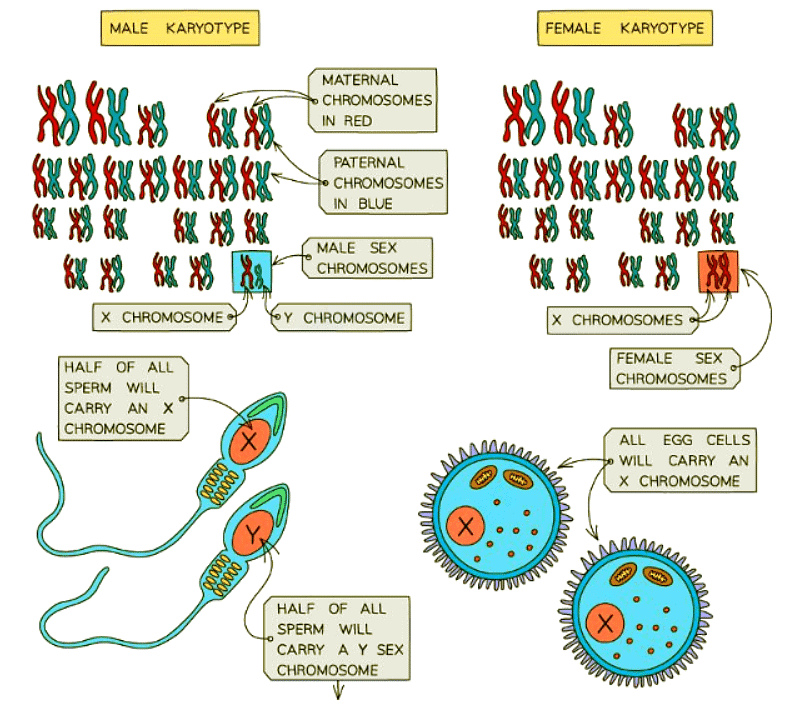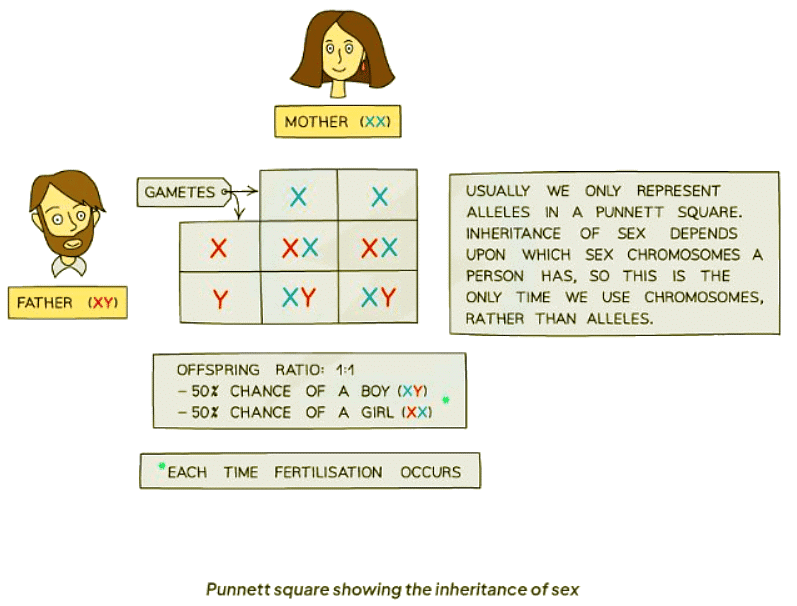Year 11 Exam > Year 11 Notes > Biology for GCSE/IGCSE > The Inheritance of Sex
The Inheritance of Sex | Biology for GCSE/IGCSE - Year 11 PDF Download
XX & XY Chromosomes
- Sex is determined by an entire chromosome pair (unlike most other characteristics, which are determined by genes)
- Females possess the sex chromosomes XX
- Males possess the sex chromosomes XY
- Only fathers can pass on a Y chromosome, playing a crucial role in determining the child's sex
- This occurs because during ejaculation, a father releases approximately 250 million sperm cells. Half of these (125 million sperm) carry the X chromosome. If one of these fertilizes the egg, a female fetus will develop. The remaining 125 million sperm carry the Y chromosome, leading to a male fetus if one fertilizes the egg.


- The inheritance of sex can be illustrated using a genetic diagram, called a Punnett square, where the X and Y chromosomes are used instead of the alleles typically shown in the boxes.

Question for The Inheritance of SexTry yourself: What determines the sex of an individual?View Solution
The document The Inheritance of Sex | Biology for GCSE/IGCSE - Year 11 is a part of the Year 11 Course Biology for GCSE/IGCSE.
All you need of Year 11 at this link: Year 11
|
110 videos|158 docs|34 tests
|
FAQs on The Inheritance of Sex - Biology for GCSE/IGCSE - Year 11
| 1. How are sex determined in humans? |  |
Ans. In humans, sex is determined by the combination of sex chromosomes inherited from the parents. Typically, females have two X chromosomes (XX), while males have one X and one Y chromosome (XY).
| 2. How do sperm cells play a role in determining the offspring's sex? |  |
Ans. Sperm cells carry either an X or a Y chromosome. When a sperm carrying an X chromosome fertilizes an egg, the offspring will be female (XX). If a sperm carrying a Y chromosome fertilizes an egg, the offspring will be male (XY).
| 3. Can a mother determine the sex of her offspring? |  |
Ans. No, the sex of the offspring is determined by the father's sperm cell, which carries either an X or a Y chromosome. The mother's egg always carries an X chromosome, so the father's contribution determines the sex of the offspring.
| 4. What happens if a sperm with an abnormal number of sex chromosomes fertilizes an egg? |  |
Ans. If a sperm with an abnormal number of sex chromosomes fertilizes an egg, it can result in genetic disorders such as Turner syndrome (XO) or Klinefelter syndrome (XXY). These conditions can affect the development of sexual characteristics and reproductive systems.
| 5. Are there any exceptions to the XX and XY chromosome pattern in determining sex? |  |
Ans. Yes, there are exceptions such as individuals with variations in sex chromosome number, such as XXY (Klinefelter syndrome) or X0 (Turner syndrome). These variations can lead to differences in sexual development and reproductive abilities.

|
Explore Courses for Year 11 exam
|

|
Signup for Free!
Signup to see your scores go up within 7 days! Learn & Practice with 1000+ FREE Notes, Videos & Tests.
Related Searches
















